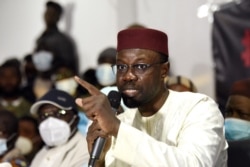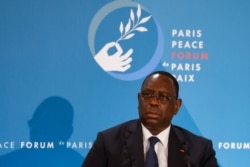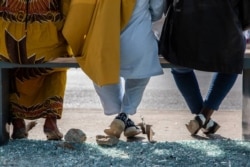Violent protests erupted in Senegal over the past week, sparked by the arrest of opposition leader Ousmane Sonko on a rape charge he says is politically motivated. But for Senegalese women who endure high levels of domestic violence, the protests are also about showing solidarity for victims of sexual abuse.
Hundreds of women dressed in white gathered in Dakar Monday to express their frustrations with the government and to show support for sexual abuse victims.
The event was just one of many protests that have taken place over the last week, since the arrest of the country’s main opposition leader Ousmane Sonko, who is accused of raping a masseuse. He was freed on bail Monday.
Senegalese President Macky Sall has been accused of arresting other political rivals on false charges since he took office in 2012. Many fear he will try to violate the constitution and seek a third term when his current term expires in 2024.
Sall denies that Sonko’s arrest was politically motivated.
Katouch Diop is an actress who attended the protest. She identifies as apolitical and doesn’t support Macky Sall or Ousmane Sonko. She attended the protest to fight for democracy and for the rights of victims of sexual abuse.
She says the accuser is a woman, first and foremost. "When you’re a victim of rape, you have the right to be heard and for it to not be politicized, because the problem is, if it did not happen, then all the women who have endured abuse, they’re screwed," she said. All she asks is that justice is served and that people listen to the accuser.
The sometimes violent clashes between protesters and security forces have shaken a nation known for its culture of peace and touted for its stable democracy. At least eight people have died, some at the hands of armed security forces, according to Amnesty International.
Several businesses have been looted. French grocery chain Auchan — which many protesters view as a vestige of French colonialism — has been a prime target.
Houreye Thiam helped organize the women’s protest.
She says the women are mobilized so that they can fight for justice. But they must also respect the peace, which they strongly need, she says.
The unrest has continued despite Sonko's release.
The predominantly male protesters are now venting their frustrations over unemployment, police violence and the economic toll of a COVID-19 curfew at 9 p.m. local time. On Tuesday the government pushed the start of the curfew to midnight, with it ending at 5 a.m.
Meanwhile, the woman accusing Sonko of rape has been disparaged on social media. Female protesters are hoping to hear more calls for an end to a culture of victim shaming.
DIatou Sonko, a volunteer with Jgen, a women’s rights organization, says that every time a girl accuses someone of rape, people ask what she was wearing. So, this dissuades victims from reporting. They think that if they report it, their name will be dragged through the mud, she says.
Until last year, rape was only considered a misdemeanor in Senegal.








